[Big read] Border waltz: In Heihe, Russians cross to China for brighter smiles and warmer ties
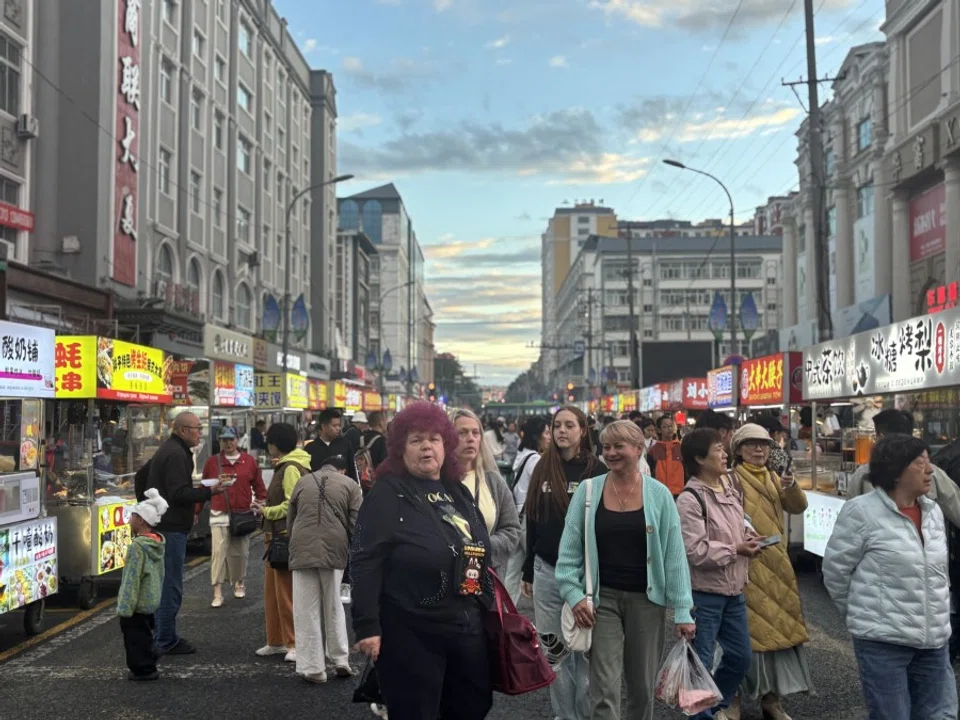
In Heihe, a Chinese city across the river from Russia, dental clinics outnumber cafes — and Russian visitors fill their chairs. As Moscow leans closer to Beijing, this small border town tells a larger story of shifting power, dependence, and quiet cooperation. Lianhe Zaobao correspondent Lim Zhan Ting reports from the border city of Heihe in China’s Heilongjiang province.
(Photos: Lim Zhan Ting)
On the streets of Heihe, a border city in China’s Heilongjiang Province, Russian-style architecture and bilingual Chinese–Russian shop signs blend into a distinctive frontier landscape. Amid this cross-border bustle, one thing catches the eye — rows of dental clinics lining the streets.
Push open the door to one of these clinics, and you’ll likely find the waiting room filled with blond-haired, blue-eyed patients — Russians who have crossed the border in search of affordable, high-quality dental care. One Russian patient, Konstantin Vasetsky, told Lianhe Zaobao: “I came to China specially to see a dentist. It’s just too expensive in Russia.”
“Dental tourism” has become a unique industry in Heihe, with medical travellers like Konstantin now forming an important pillar of the local economy.
Dental tourism
Konstantin travelled from Blagoveshchensk, the Russian city just across the river from Heihe — only about 700 metres away — to have dental crowns fitted on his lower teeth. The treatment took four days and cost 240,000 roubles (US$2,975). That may not sound cheap, but according to him, the same procedure in Russia would cost three times as much.
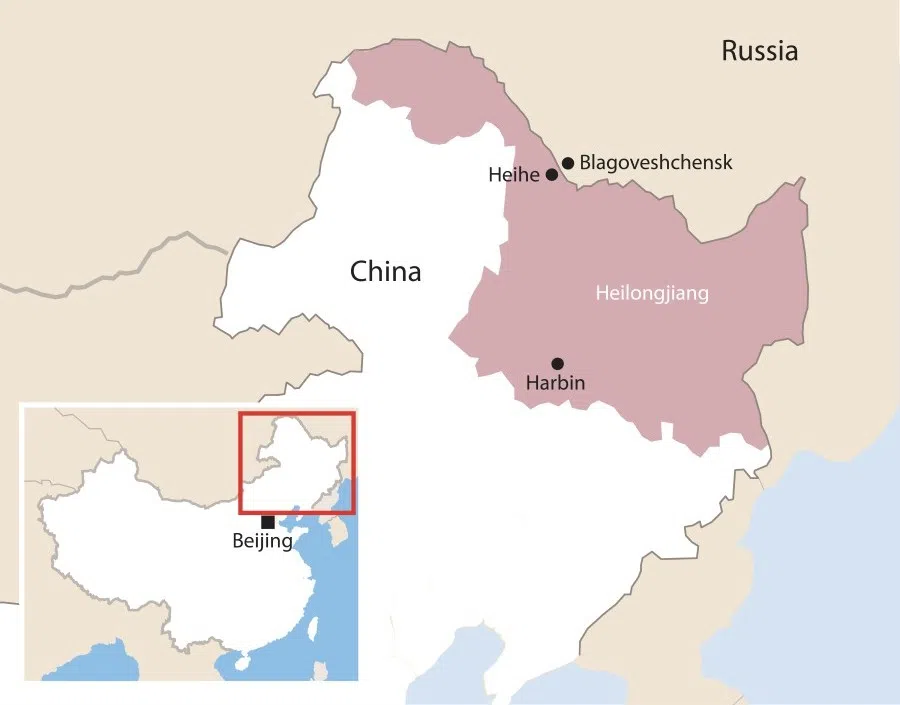
“Dental tourism” has become a unique industry in Heihe, with medical travellers like Konstantin now forming an important pillar of the local economy. Besides seeking dental care, they often take the opportunity to sightsee and shop, further boosting local consumption.
Cross-border spending between China and Russia has a long history — but it came to an abrupt stop in 2020, when pandemic border closures brought the steady flow of visitors and trade to a sudden halt. After more than three years of quiet, the border reopened in 2023, coinciding with a further warming of bilateral relations following the outbreak of the war in Ukraine. Cross-border exchanges have since revived with fresh vigour.
According to Heihe’s immigration statistics, after the city reinstated the visa-free policy for Chinese and Russian tour groups in September 2023, border traffic surged. In the first eight months of the following year, over 440,000 entries were recorded — an increase of 160% year-on-year.
For Russians visiting Heihe, the main draw is simple: things are cheaper. With the war in Ukraine triggering inflation and price hikes, many have been crossing the river to seek more affordable goods and services.
Take dentistry, for instance. Russia used to rely on European imports for dental materials, but Western sanctions have disrupted those supply chains, driving up costs. As a result, many residents of Russia’s Far East now choose to cross into China for dental care.
“Fifteen years ago, Russians generally thought China’s dentistry wasn’t very advanced. But now, many people come here specially for dental treatment — the technology and materials here are better than in Russia.” - Russian patient Konstantin Vasetsky
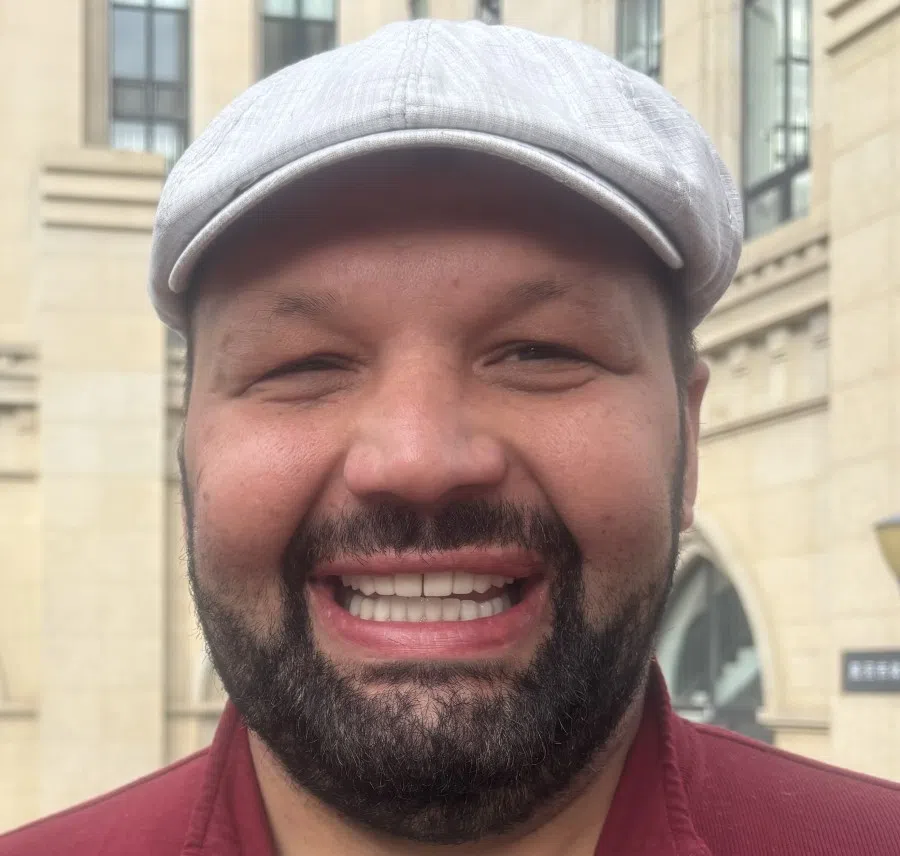
Konstantin, who had just received his new dental crowns, said he was very pleased with the results. Grinning to show off his freshly restored white teeth, he told me: “Fifteen years ago, Russians generally thought China’s dentistry wasn’t very advanced. But now, many people come here specially for dental treatment — the technology and materials here are better than in Russia.”
In Heihe, a complete industry chain of “dental tourism” has quietly taken shape. A business operator who declined to be named revealed that there are more than a dozen private dental clinics scattered throughout the city, some of which attract clients through social media advertisements in Russian. Russian patients are often organised into groups by local intermediaries, and upon arriving in Heihe, they are met by Chinese guides who handle transportation, interpretation, and full travel arrangements, much like a package tour.
Russian visitors revive border city
The return of Russian visitors has breathed new life into the streets of Heihe. At two of the city’s most popular attractions — the morning and night markets — Russian tourists can be seen every morning and evening weaving through the stalls, buying snacks and goods from vendors who can speak some Russian.
Steamed buns, soy milk, and other Chinese snacks in hand, these Russians have become a charming feature of the city’s everyday life. Some Chinese livestreamers, sensing the opportunity for online traffic, set up their phones to film the foreign visitors, repeating familiar lines such as: “This is the most vibrant morning market in town.”
“Russia’s light industry isn’t very developed, so Russians come here to shop.”
“Look at this beautiful Russian lady — isn’t she stunning?”
Most Russians caught on camera respond with calm smiles, and when asked for a photo, they usually agree, seemingly accustomed to being part of the spectacle even as they sightsee.
Roman Gushchin, a young Russian visiting Heihe with his mother for dental treatment and sightseeing, described the local night market: “During the day, it’s pretty quiet and the streets aren’t all that clean. But at night, when the lights come on, the whole atmosphere transforms.”
...in the past, Russian customers were willing to spend 3,000 RMB (US$420) on a single garment, but now most only look for bargains. - Clothing shop owner Chen Xijun
Russians also flock to Huafu Mall in the city centre. Though the building is old and its walls have yellowed with time, it remains one of Heihe’s most popular shopping destinations.
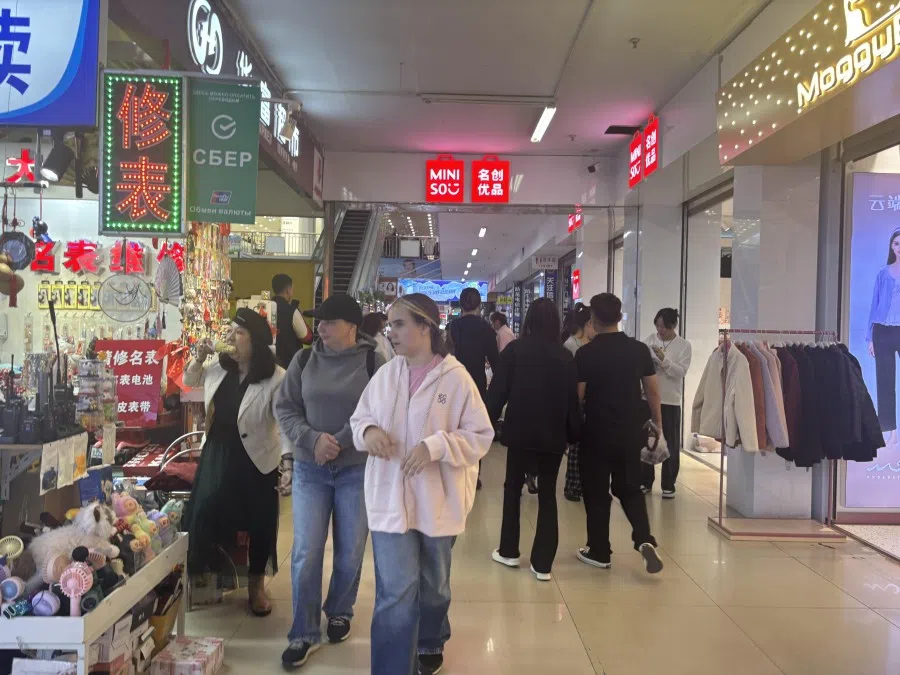
Selling affordable clothing, food, and electronics, it serves as a supply station for budget-conscious Russians. Shopper Regina Akhiyarova explained: “In Russia, because of the sanctions, everything is expensive. Chinese goods are more affordable, and there’s a much wider variety.”
Clothing shop owner Chen Xijun observed that most Chinese consumers have shifted to online shopping, leaving Russian tourists as the main customers sustaining brick-and-mortar apparel stores. He said bluntly: “Heihe survives because of the Russians. Without them, it’s nothing.”
Less spending power as Russian wallets shrink
The return of Russian visitors is undoubtedly good news for Chinese businesses, but crowds don’t always translate into spending. Many shopkeepers in Heihe have noticed that over the past three years, Russian customers’ wallets have visibly shrunk.
This is largely due to the sharp depreciation of the rouble following the outbreak of the war in Ukraine, which has weakened Russians’ purchasing power abroad.
Chen remarked, “After the war began, Russians had less money — they’re buying fewer things now.”
He recalled that in the past, Russian customers were willing to spend 3,000 RMB (US$420) on a single garment, but now most only look for bargains.
Ms Tian, who runs a mobile phone parts shop, estimated that Russian spending has dropped by about 40% since the war. “You can really see how much damage the war has done to people,” she sighed.
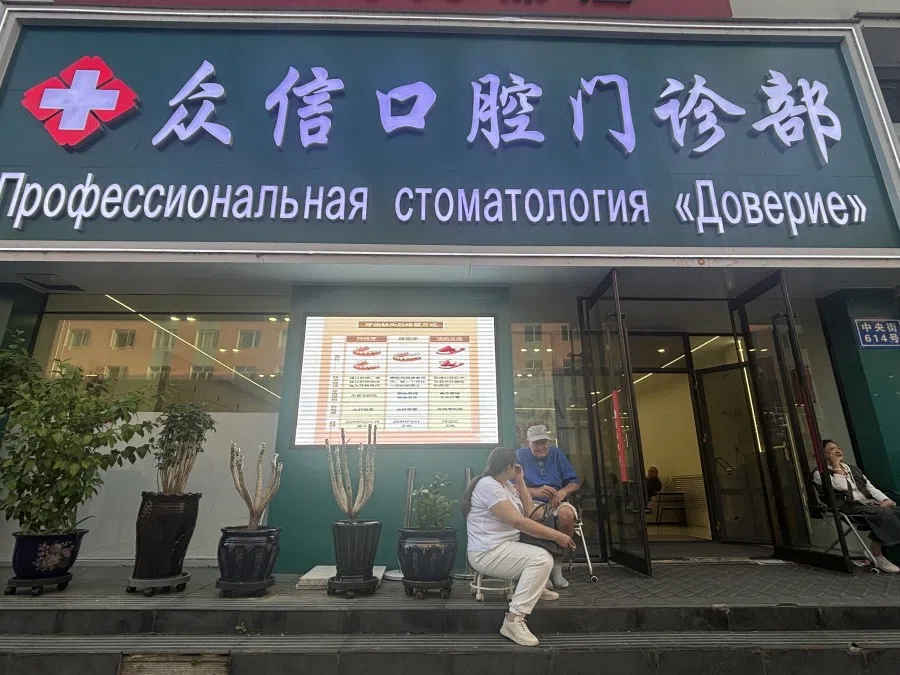
Even the lucrative cross-border dental trade has not escaped controversy. The Russian outlet Ljudi Bajkala reported that while many Russians cross the border for affordable dental care, this kind of “assembly-line dentistry” comes with hidden risks — from mid-treatment price hikes and rushed procedures to having no recourse if problems emerge back home.
In August last year, the Russian Consulate in Harbin issued a public advisory for citizens travelling to China for dental work, noting a rise in complaints and urging patients to choose clinics carefully and confirm services and prices in advance.
When I visited several clinics, most managers were reluctant to speak. One admitted quietly: “We’re not exactly licensed. But if you want to find Russians, just walk down the street — there are plenty.”
Merchants hope visa-free policy will boost business
While many merchants lament that business isn’t what it used to be, in this border city whose fate is intertwined with Russia, closer China–Russia relations have given local shopkeepers hope.
Since the collapse of the Soviet Union in the 1990s, China–Russia relations have steadily grown closer. The outbreak of the Russia–Ukraine war in 2022 became a major catalyst: as Russia suffered severe Western sanctions and China faced strategic pressure from the US and its allies, the two countries drew ever closer under shared external constraints. Their bilateral trade volumes have repeatedly hit record highs.
A landmark move came on 15 September, when China introduced a visa-free policy for Russian citizens, expanding from group visa exemptions to individual visa-free entry.
In early September this year, Russian President Vladimir Putin visited China, making high-profile appearances at the Shanghai Cooperation Organisation (SCO) Summit in Tianjin and the Victory Day military parade in Beijing on 3 September, where he met Chinese President Xi Jinping. Putin described the current state of China–Russia relations as being at “an unprecedentedly high level”, pushing bilateral ties to yet another peak.
Soon after, the two countries announced plans to deepen cooperation across multiple fields. A landmark move came on 15 September, when China introduced a visa-free policy for Russian citizens, expanding from group visa exemptions to individual visa-free entry. In Heihe, this was headline news, and it excited local merchants who depend on Russian clientele.
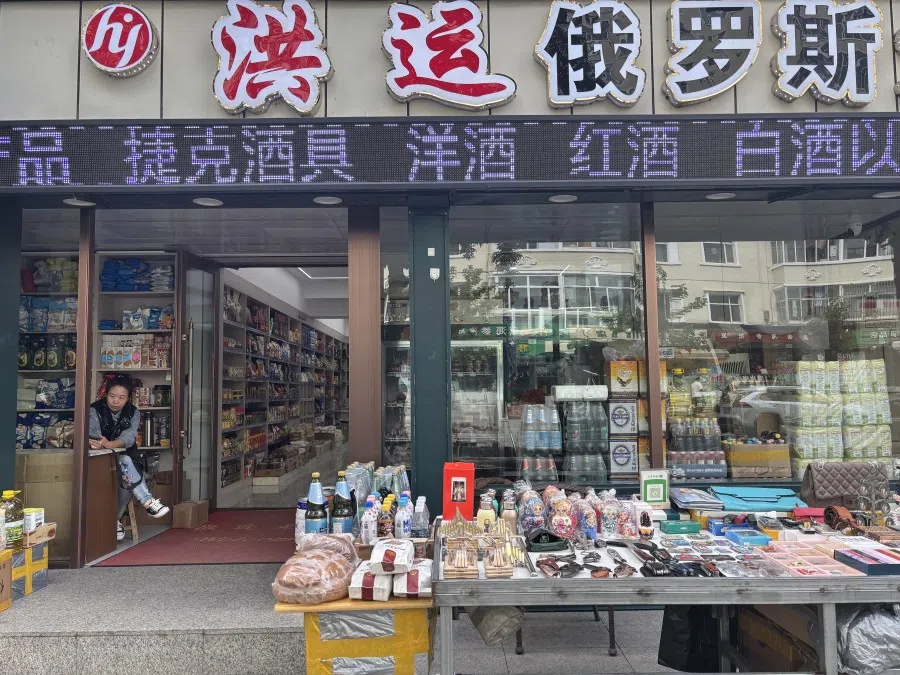
One shop owner surnamed Chen recalled how border trade had ground to a halt during the pandemic, forcing many Heihe residents to migrate south in search of work. After the pandemic, the spending power of Russian customers weakened noticeably, and the city had yet to fully recover. He hopes the new visa-free policy will draw more Russians across the border and revitalise Heihe’s economy.
Another shop owner, Cao Qiuju, interviewed two weeks after the policy took effect, said there had indeed been more Russian customers, and business was up by about 20%, though still below pre-pandemic levels.
“I hope the government will roll out more good policies to make business easier,” she said. “I just want our hometown to get better and better.”
China’s growing soft power: Russians becoming more ‘pro-China’
During his visit to Heihe, Konstantin Vasetsky, who came for dental treatment, also took time to explore the early-morning market that opens at 5 am. He was struck by what he saw: “The Chinese are such hardworking people. At five in the morning, they’re already doing business — busy nonstop.”
He added: “China keeps improving. Just look at all the cars on the streets — you can’t help but marvel at how much they’ve achieved in such a short time. And they keep moving forward — they never stop.”
Twenty years ago, only one in five Russians viewed China as a major power; today, that share has risen to two-thirds.
Konstantin’s words, filled with admiration and even envy, reflect how the warming of China–Russia relations extends beyond trade and politics into public sentiment and perception. In the eyes of many Russians, China has become increasingly attractive.
Since the war in Ukraine began, many Western companies have withdrawn from the Russian market, making Russia more dependent on Chinese consumer and industrial goods — a trend that has also created fertile ground for China’s soft power to expand.
According to a survey by Russia’s independent Levada Center, public favourability toward China rose to a record 92% in late 2022, following the outbreak of the war. Twenty years ago, only one in five Russians viewed China as a major power; today, that share has risen to two-thirds.
Beyond tourists, Heihe has also attracted Russians who choose to live or work there. Many praise the social environment, cost of living, and everyday convenience in China.
Natalia Troianskaia, who came to Heihe two years ago to work as a baker, said frankly: “I have no plans to go back to Russia. I want to live and work in China — it’s a better place to live than Europe or the US. China is very advanced, and its technology is highly developed.”
In her bakery, Natalia works behind the counter, but her blonde hair and blue eyes have made her a draw. After social media posts revealed that the shop had a Russian baker, more and more customers have begun dropping by out of curiosity.
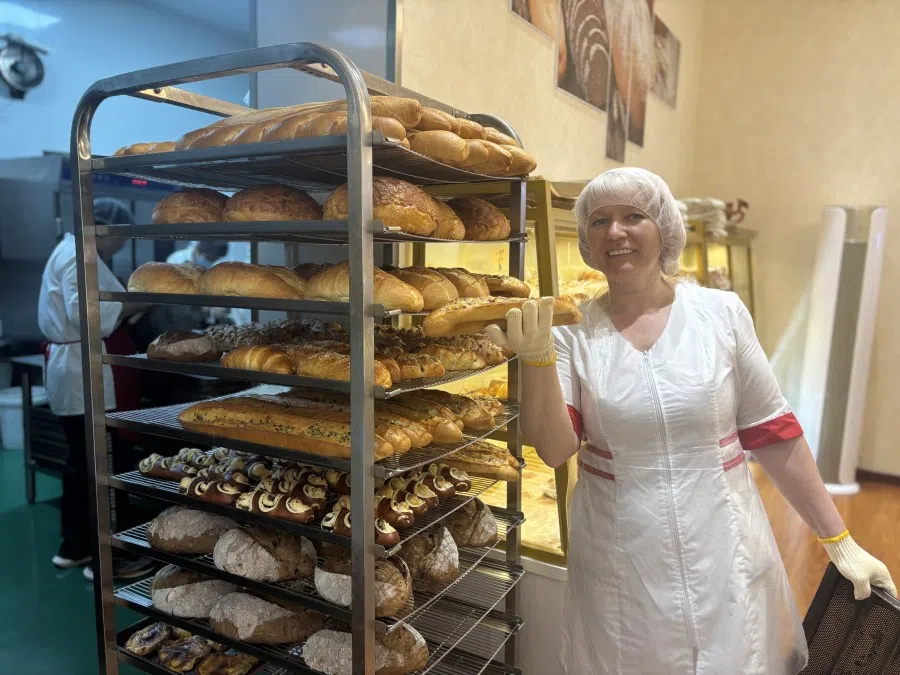
Another long-time resident, Andrey, a Russian who came to Heihe 15 years ago to open a honey shop, has fully adapted to life in China. He married a Chinese wife and now speaks fluent Mandarin with a Northeastern accent. Reflecting on the changes over the years, he said: “Since General Secretary Xi Jinping took office, China–Russia relations have become closer year by year. Naturally, Russians’ impression of China has also improved.”
Andrey and Natalia Troianskaia are not exceptions. According to Russia’s Nezavisimaya Gazeta, about 11,000 Russian citizens move to China every year, and there are now around 50,000 Russians living permanently in the country, with Beijing and Shanghai hosting the largest numbers.
“But sometimes I wonder — their country is so big, why aren’t they more enterprising about making these things themselves?” - Staff member at a dental clinic
On the Chinese side, locals generally express trust and goodwill toward their Russian neighbours. Ms Tian, who runs a mobile phone parts shop, said she has always had a good impression of her Russian customers: “They’re polite and well-mannered. Many have become regulars. I never raise prices just because they’re Russian.” Having run her shop for over a decade, she added that she has never had a conflict with a Russian customer.
However, one staff member at a dental clinic — who asked not to be named — admitted that such goodwill sometimes comes mixed with a sense of superiority: “Their light industry isn’t very developed, so they often come here to shop,” he said. “We earn good business from them, so of course we welcome them. But sometimes I wonder — their country is so big, why aren’t they more enterprising about making these things themselves?”
Historical disputes gradually fading
Although China–Russia relations are now at a high point, their history has not been without friction. Heihe was once known as Aigun, the site where the Treaty of Aigun was signed in 1858, after Tsarist Russia coerced the Qing government into ceding vast tracts of northeastern frontier territory. In 1969, armed clashes broke out between China and the Soviet Union over Zhenbao (Damanski) island, pushing the two countries to the brink of confrontation.
Since the collapse of the Soviet Union, however, bilateral relations have steadily improved over the past three decades. In a border city like Heihe, whose livelihood depends on trade with Russia, these historical grievances have largely faded from public memory. In fact, China and Russia reached a consensus in their border demarcation talks in 2004, and both governments have since downplayed past disputes and focused instead on pragmatic cooperation.
Associate Professor Wei Bai-Ku from the Graduate Institute of Russian Studies at National Chengchi University noted that since 2006, China and Russia have held a series of themed “National Years” to strengthen cultural and people-to-people ties — such as the “Year of the Chinese Language” in Russia and the “Year of Russian Tourism” in China.
...judging from the current situation, there is no sign of a cooling in China–Russia relations anytime soon. - Associate Professor Wei Bai-Ku, Graduate Institute of Russian Studies, National Chengchi University
Wei explained that the US is now a key external factor shaping China–Russia relations: “If US–Russia relations don’t improve and US–China tensions persist, then the logic of ‘the enemy of my enemy is my friend’ will naturally drive China and Russia even closer. Both sides will be more willing to set aside potential conflicts, such as competition in Central Asia.” He concluded that, judging from the current situation, there is no sign of a cooling in China–Russia relations anytime soon.
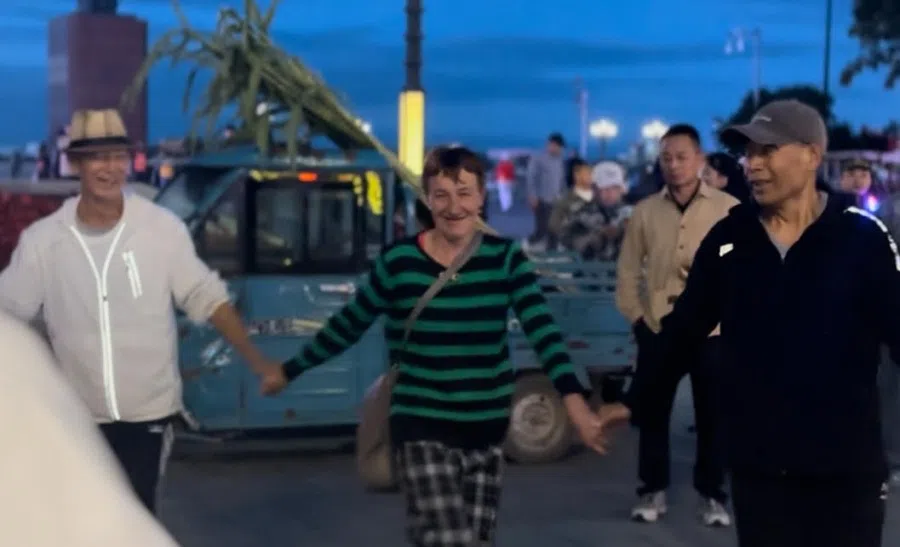
At dusk, in a corner of Mother’s Square along Heihe’s riverside, a Russian woman takes the hands of two elderly Chinese men and joins them in a dance. Her steps are slightly awkward, but she moves with steady rhythm, never missing a beat.
The scene feels like a vivid metaphor for China–Russia relations: not a perfect match by nature, yet still dancing together on the same stage.
This article was first published in Lianhe Zaobao as “中俄暖风吹黑河 市井烟火带寒意”.





![[Big read] When the Arctic opens, what happens to Singapore?](https://cassette.sphdigital.com.sg/image/thinkchina/da65edebca34645c711c55e83e9877109b3c53847ebb1305573974651df1d13a)